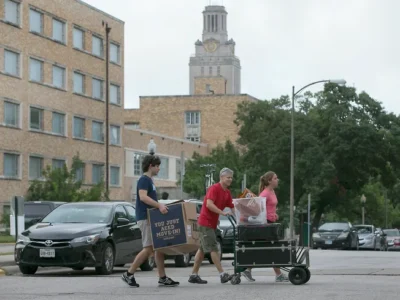Originally published on the Austin American-Statesman website
Jay Hartzell and Allan Cole
As a community of over 70,000 people, the second-largest employer in the region, and a collection of experts across a variety of related fields, the University of Texas plays a key role in addressing Austin’s rising housing costs. Like many organizations in this fantastic city, the benefits we gain from being together are at risk due to escalating home prices and rents, along with our ability to attract and retain the talented students, faculty and staff we rely upon to change the world. As a result, we have accelerated our housing affordability strategy to expand options for our university community and be part of the greater solution.
Since 2015, Austin has had the nation’s fourth-fastest-growing economy among large cities, with no signs of slowing. Our metro-area population of 2.2 million is expected to nearly double by 2050. The resulting imbalance between changes in housing supply and demand has drastically reduced affordability, and the Federal Reserve Bank of Dallas estimates only 21% of Austin families can afford a home.
Access to housing on or near campus is fundamental to our core objective of enabling students to pursue their dreams and benefit society. The data clearly show students’ proximity to campus, with greater access to food, academic support and social activities, increases persistence and success. This is especially true for first-generation and lower-income students, who comprise about a quarter of our 40,000-plus undergraduate student body.
The Austin City Council recently resolved to define affordable student housing solutions, and we are excited to continue working with Mayor Kirk Watson and city leadership on this important shared goal. This is a key part of our university’s 10-year strategic plan. To help reduce students’ housing barriers, we have two primary strategies: lowering cost and increasing supply.
This week, we are launching a pilot scholarship program to help offset the cost of housing for students with the greatest financial needs. The program, which initially prioritizes first-year students, will provide scholarships to reduce housing costs by up to $1,800 per academic year for students with need who choose to live in university residence halls. This scholarship program will impact more than 3,500 students, many of whom would otherwise resort to commuting.
Increasing housing supply helps control prices and rents, and greater supply of university-owned housing adds access and rent revenue to fund more need-based scholarships. We recently purchased and updated Dobie Tower on the south side of campus, adding 778 beds for undergraduates. Another 784 beds for graduate students are under construction. We are exploring new housing on underdeveloped university-owned land, adding capacity to existing residence halls and opportunities to acquire existing housing near campus. Our work in this area is just beginning.
We are applying similar strategies to recruit and retain our workforce talent, including partnering to create innovative financial products to lower the costs of debt. We recently purchased the Boulevard at Town Lake apartments on Lake Austin Boulevard, which we will gradually prioritize for faculty members. The same rationale for increasing supply of university-owned housing for students applies to our faculty and staff members, and we also look forward to exploring ways to increase the supply of this type of housing.
These and similar solutions could help solve housing affordability on a larger scale. The Steve Hicks School of Social Work recently launched the Center for Societal Impact to align interdisciplinary research, instruction and community partnerships to solve critical social problems, including housing affordability. By generating ideas to pilot and study, we can deliver innovative models that can be replicated and scaled to expand housing options, whether on campus or throughout Austin.
As we launch this phase of our strategy, we aspire to identify and implement solutions that benefit all, while preserving the unique qualities of the city we all value and embrace.
Hartzell is president of the University of Texas.
Cole is dean of the Steve Hicks School of Social Work at the university.


